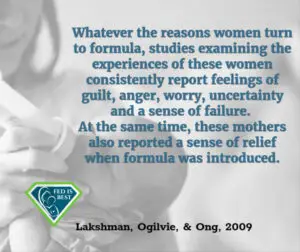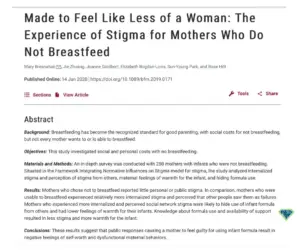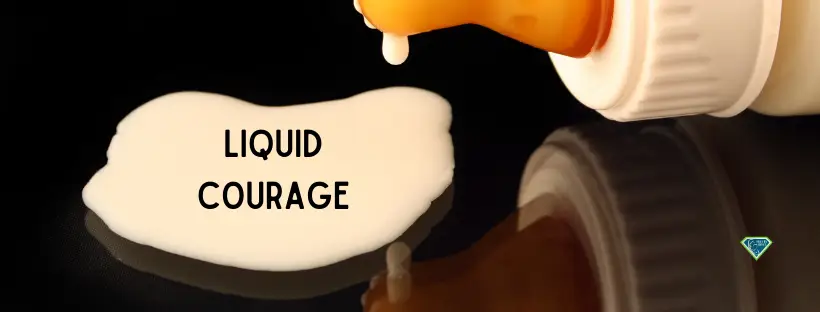Written by: Sarah L. R.
“I think it would be very courageous for you to do this.”
My psychiatrist leaned forward in his chair, clasped his hands together, and smiled at me.
Grabbing a tissue from the box on the table, I sniffed, “Then why do I feel like the biggest coward for making this decision?!”
“Sarah, what’s braver than making sure you’re the best mother you can be?”
It took several more conversations and even more tissues, but eventually, I made the decision to forgo breastfeeding entirely, and feed my daughter formula milk from birth. In doing so, I hoped to avoid postpartum depression and anxiety that haunted my earlier experiences as a new mother.
My PPD/A journey began the moment my first child exited my body. The lack of connection and emotion I felt toward my new daughter, the choking feeling of anxiety, and the dark mist that settled over my entire life was something I thought was just part of being a mother. I thought I was wired differently from most, and that maybe I’d find that spark of joy once she was older. It took six months for me to feel normal again, and only after we switched to formula feeding. The experience was similar to my second child, but with the sharpest edges blunted by an SSRI medication.

By my third pregnancy, the probability of experiencing PPD/A was extremely high. Working with a therapist, my Obstetrician, and psychiatrist, we traced the root of my PPD/A to breastfeeding and the negative psychological effect it had on my day to day life. I also had found a more effective depression medication, which was contraindicated while breastfeeding.
The choice to switch to formula feeding might be an easy decision for some mothers, yet it wasn’t for me. I didn’t know anyone who chose to not breastfeed; everyone I knew switched to formula because of supply issues. Everything on social media and mommy blogs shouted “breast is best”, and formula feeding was perceived as second-rate nutrition. It seemed selfish to put my mental health ahead of the needs of my baby; and I felt guilty for not wanting to do something so many women desperately wanted to experience.

This research suggests that public responses causing a mother to feel guilty for using infant formula result in negative feelings of self-worth and dysfunctional maternal behaviors. This paves the way for self-blame and potentially robs women of their authority to be the decision-makers for their infants’ nutritional needs
As difficult as post-partum depression and anxiety were, I was still able to mask it. I assumed the effects were all in my head, with no tangible consequence. But looking back now on those first two postpartum experiences, I can see that my husband and children suffered, too; they were the victims of my angry outbursts, lack of energy, and emotional distance.
Once I finally realized I would be sacrificing my peace for what some consider the apex of motherhood—breastfeeding– the choice was easy. This dilemma was one of many my family will face in the future: do we do what’s best for us as a family unit, even if it’s an unpopular choice? Is the turmoil that comes from allowing the opinions of others dictate what my family does, worth it? Absolutely not.
Going into labor, I felt a deep sense of peace about not breastfeeding. My OBGYN had already written on my chart that I was choosing to formula feed, so the nurse didn’t hesitate to take my daughter to the nursery and gave her a bottle while I took a much-needed nap. While I was in the hospital, I pumped for the colostrum, but once we got home, she was exclusively formula-fed.
I knew I had made the right decision about two weeks in when I felt “the new mom glow”—that overwhelming sense of happiness and contentment that follows birth. I had never felt it before, ever.
My anxiety was kept in check because I had my daughter on a set schedule; she slept better because her belly stayed fuller longer with the formula, and I was able to get help with feedings. I actually liked my newborn; even though I wasn’t breastfeeding, I bonded with her sooner than my older ones.
The shame and guilt I wrestled with in the psychiatrist’s office were replaced with the feeling of contentment, knowing I had made the right decision for our family. Thanks to the support of physicians and family, I could listen to my body, and ignore the stigma society places on formula-feeding.

As difficult as post-partum depression was, I look forward to sharing with all three of my daughters the lessons I’ve learned from it. And one of those will be this: sometimes courage comes in the form of baby formula. -Sarah
Maternal Mental Health Feels Like it Comes Second to Breastfeeding When It Should Be First
Clinicians’ Guide to Supporting Parents with Guilt About Breastfeeding Challenges
http://fedisbest.org/2019/08/kristen-umunna-talks-about-breastfeeding-and-becoming-a-fearless-formula-feeder/
HOW YOU CAN SUPPORT FED IS BEST
There are many ways you can support the mission of the Fed is Best Foundation. Please consider contributing in the following ways:
- Join us in any of the Fed is Best volunteer and advocacy, groups. Click here to join our health care professionals group. We have: FIBF Advocacy Group, Research Group, Volunteer Group, Editing Group, Social Media Group, Legal Group, Marketing Group, Perinatal Mental Health Advocacy Group, Private Infant Feeding Support Group, Global Advocacy Group, and Fundraising Group. Please send an email to Jody@fedisbest.org if you are interested in joining any of our volunteer groups.
- If you need infant feeding support, we have a private support group– Join us here.
- If you or your baby were harmed from complications of insufficient breastfeeding please send a message to contact@fedisbest.org
- Make a donation to the Fed is Best Foundation. We are using funds from donations to cover the cost of our website, our social media ads, our printing and mailing costs to reach health providers and hospitals. We do not accept donations from breast- or formula-feeding companies and 100% of your donations go toward these operational costs. All the work of the Foundation is achieved via the pro bono and volunteer work of its supporters.
- Sign our petition! Help us reach our policymakers, and drive change at a global level. Help us stand up for the lives of millions of infants who deserve a fighting chance. Sign the Fed is Best Petition at Change.org today, and share it with others.
- Share the stories and the message of the Fed is Best Foundation through word-of-mouth, by posting on your social media page and by sending our FREE infant feeding educational resources to expectant moms that you know. Share the Fed is Best campaign letter with everyone you know.
- Write a letter to your health providers and hospitals about the Fed is Best Foundation. Write to them about feeding complications your child may have experienced.
- Print out our letter to obstetric providers and mail them to your local obstetricians, midwives, family practitioners who provide obstetric care and hospitals.
- Write your local elected officials about what is happening to newborn babies in hospitals and ask for the legal protection of newborn babies from underfeeding and of mother’s rights to honest informed consent on the risks of insufficient feeding of breastfed babies.
- Send us your stories. Share with us your successes, your struggles and everything in between. Every story saves another child from experiencing the same and teaches another mom how to safely feed her baby. Every voice contributes to change.
- Send us messages of support. We work every single day to make infant feeding safe and supportive of every mother and child. Your messages of support keep us all going.
- Shop at Amazon Smile and Amazon donates to Fed Is Best Foundation.
Or simply send us a message to find out how you can help make a difference with new ideas!
For any urgent messages or questions about infant feeding, please do not leave a message on this page as it will not get to us immediately. Instead, please email christie@fedisbest.org.
Thank you and we look forward to hearing from you!


2 thoughts on “Liquid Courage Sometimes Comes In The Form Of Baby Formula”